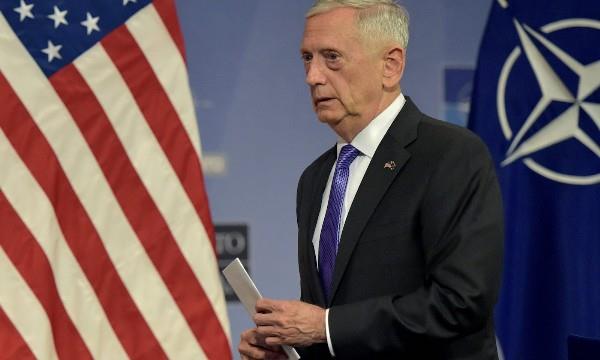
Pentagon's new strategy at odds with Trumplomacy
The recent visit to Indonesia and Vietnam by US Defense Secretary James Mattis demonstrates Washington's growing commitment to building relationships with . The of the United States, which Mattis partially unveiled on January 19, envisages the construction of a more lethal armed force to counter China and Russia, viewed as America's strategic competitors for years to come.
To preserve the global influence of the United States, this modern military needs to be combined with a 'robust constellation of allies and partners,' the document states. But while US President Donald Trump may find it relatively easy to build a new powerful armada, he may struggle to entice new friends and keep old ones as the post-Cold War international order dominated by Washington is challenged by rising actors and threatened by multiple centrifugal forces.
Must-reads from across Asia - directly to your inboxNot even during the George W Bush era, when hat US president's 'preventive war' doctrine caused a deep rift in the Euro-Atlantic community, was Washington's network of alliances and partnerships as in bad shape as it is today.
Dealing with Turkish and Saudi adventurismIn the Middle East, the US will have to create 'enduring coalitions' against terrorist outfits and hostile actors, according to the Pentagon's new defense strategy. The problem is that Washington's diplomatic framework in the region is in shambles. Turkey, the southeastern bulwark of the Northern Atlantic Treaty Organization, is fighting Kurds in northern Syria. The Kurdish YPG militia is the most reliable asset of the United States in the Syrian quagmire, and this has triggered a spat between Ankara and the Trump administration.
Trump said last May that he would work to set up an 'Arab NATO' in the Middle East. Saudi Arabia's feud with Qatar, which is accused by Riyadh of cozying up to Iran (the House of Saud's regional arch-rival), has opened a crack in the US-backed front of Persian Gulf monarchies, making this complex initiative far more challenging.
Jerusalem, Iran and Europe's malaiseAs well, Trump's decision to recognize Jerusalem as Israel's capital and move the US Embassy there has alienated not only the Arab camp, which believes the US president's Middle East policy is undermining an already moribund peace process between the Palestinians and the Israeli government, but also European allies.
The most divisive issue between the European Union and Trumpian America is Iran, however. to prevent Trump from sinking the multilateral deal that world powers signed with Tehran in 2015 in an attempt to curb the military dimension of its nuclear program.
Trump's cutting remarks about EU countries' trade surplus with the US and resistance to paying their fair share of NATO's expenses have also contributed to damaging relations between Washington and many allies in the Old Continent. Common dissatisfaction with China's trade and investment practices alone cannot put the US-EU alliance back on track. Opposition to Russia's resurgence has more chance of revitalizing trans-Atlantic links, even if the EU is still divided on how to cope with the Kremlin's maneuvering on Europe's eastern and southeastern periphery.
Trouble in the ‘Indo-Pacific'Things are not going so well for the US in the Indo-Pacific arena either, where China's geopolitical and military rise continues unabated. President Trump can say that Japan and Australia, two key US allies in the region, have adopted a more muscular policy against Beijing in his first year in office. He can also brag about having relaunched the project to build an anti-China alliance bringing together Washington, Tokyo, Canberra and New Delhi.
The reality is that China is quickly gaining ground, particularly in the South China Sea, where it is locked in territorial disputes with a number of neighbors. Just like his predecessor Barack Obama, Trump is trying to win the support of these Southeast Asian countries against Beijing, but the move has not yielded significant results so far.
What's more, Trump's handling of the North Korean nuclear crisis has created , yet another cornerstone of US diplomacy in the Pacific area. South Koreans have time and again voiced concern about the US president's harsh rhetoric and military muscle-flexing against Pyongyang.
And the US government's brand-new trade tariffs against South Korean washing machines will hardly help ease tensions with Seoul, which is pursuing a to try to halt North Korea's military activities.
Incoherent protectionismThe ability to weave solid alliances and partnerships is a critical element of US power. But despite Trump having said at the World Economic Forum in Davos, Switzerland, on Friday that his protectionist orientation does not seem appropriate for an administration that aims to expand the web of allies and partners around the world.
In this sense, one of Trump's first acts as president, his withdrawal from Obama's Trans-Pacific Partnership on trade and investment, which had more to do with economic diplomacy than commerce, is clearly at odds with the basics of the Pentagon's new defense strategy.
Asia Times is not responsible for the opinions, facts or any media content presented by contributors. In case of abuse, .
Legal Disclaimer:
MENAFN provides the
information “as is” without warranty of any kind. We do not accept
any responsibility or liability for the accuracy, content, images,
videos, licenses, completeness, legality, or reliability of the information
contained in this article. If you have any complaints or copyright
issues related to this article, kindly contact the provider above.












Comments
No comment